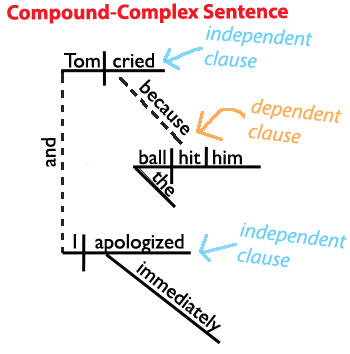Consider the sentence- I like English grammar. Definitely, this is a sentence. But do you know this is also a clause? In fact, it is both a sentence and a clause. What’s happening? Let’s learn about clauses in English grammar.
Suggested Videos
Clauses
A quick revisit of our grammar lessons tells that we group different words like adjectives, verbs, nouns etc. to form a sentence. Technically, a sentence is a group of words that makes complete sense by itself. We might also be familiar with phrases.
In contrast to a sentence, a phrase is a group of words that doesn’t have a subject, a predicate, finite verb and also is not independently meaningful. We need to use a phrase in a sentence to add meaning to it. A phrase can find use as an adjective, noun or adverb.
We can say that clauses lie somewhat in the middle of sentences and phrases. Technically, a clause is a group of words which have their own subject, predicate, finite verb and may or may not be independently meaningful. Further, clauses are of two types- principal or independent clause and subordinate or dependent clause.
Browse more Topics under Sentences
Classification of Clauses
Independent or Principal Clause
Interestingly, an independent clause is a group of words that consists of subject, predicate, finite verb and can make complete sense by themselves. So how does it differ from a sentence? Exactly, it doesn’t. An independent clause is as good as a sentence. Note that, independent clauses cannot be used as nouns, adverbs or adjectives simply because they are complete sentences by themselves. Let’s explore some examples.
- It is dark.
- You should go.
- He is intelligent but he is selfish.
- I want to come but I have some work to do.
The group of words in bold make complete sense independently and hence are examples of independent clauses.

(Source: englishgrammarrevolution)
Dependent or Subordinate Clause
As the name suggests, dependent clauses need an independent clause to complete its meaning. Again, a dependent clause also consists of a subject, predicate and a finite verb but it is not meaningful all by itself. A key point to remember is that dependent clauses, just like phrases, can be used as a noun, adverb or adjective. Let’s discuss these individually.
Noun Clause
A dependent clause that functions like a noun in the sentence and generally acts as the subject or verb of the object is known as a noun clause. For example:
- I think that you will like it. Here the noun clause- that you will like it, acts as an object of the verb think.
- Where she went is not known to anyone. Here the noun clause- where she went, acts as a subject of the verb- is not known.
Adjective Clause
An adjective clause is a dependent clause that acts as an adjective and hence qualifies a noun or pronoun in a sentence. For example:
- I used the notebook that had a red coloured cover. Here the adjective clause- that had a red coloured cover, tells about the noun i.e. the notebook.
- The hat which was made of jute was my favourite. Here the adjective clause- which was made of jute, speaks about the noun i.e. the hat.
Adverb Clause
An adverb clause is a dependent clause that does the job of an adverb i.e. modifies a verb, an adjective or another adverb in a sentence. Of course, adverbial clauses can be further classified according to the various kinds of adverbs. For example:
- Wait here till I come back. Here – till I come back, is an adverbial clause of time.
- I shall be late as I have a meeting. Here – as I have a meeting, is an adverbial clause of reason.
Note: Keep in mind as a rule of thumb that a lot of times dependent clauses start with a conjunction. This is not always true but can be of great help for identification of dependent clauses in a sentence.
A Solved Example for You
Q: Identify the adverb clauses and state their functions.
- Wait here till I come back.
- Put the key where you can find it easily.
- I am happy that you have liked it.
- We shall stay with you if it rains.
Ans:
- Till I come back – is the adverbial clause of time.
- Where you can find it easily – is the adverbial clause of place.
- That you have liked it – is the adverbial clause of reason.
- If it rains – is the adverbial clause of a condition.






Identify type of clause , it’s a lesson that has stood me in good stead
Vote mine
1 vote,= an indian student
😉😉👍🏻👍🏻👍🏻😊😊😊😊❓❓⁉️🎉
👍🏻👍🏻👍🏻👍🏻😉😉😉😉😉🙄🙄🙄🙄🙄🙄🎉⁉️⁉️⁉️⁉️⁉️⁉️⁉️⁉️⁉️⁉️❓❓❓❓⁉️❓❓😭😂👍😂👍😂🙏🏻😂🙏🏻😂🙏🏻🙏🏻😂😂🙏🏻❓🙏🏻❓❓
People continue polluting the environment _____ they know its bad effects. Subordinating conjunction
As a teacher, _______ I see people improving their English, I feel really good. Subordinating conjunction